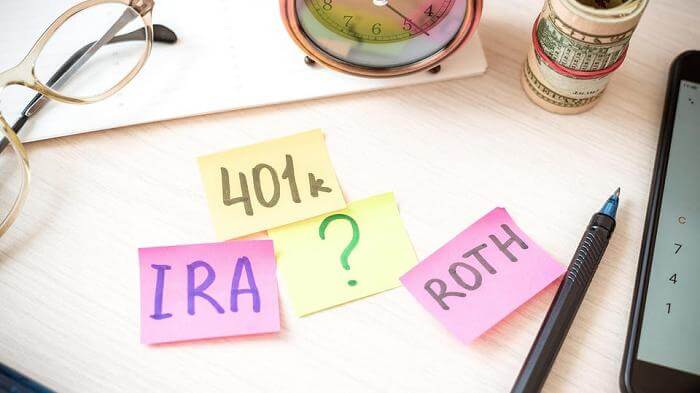Must-Know Rules for Converting Your 401(k) to a Roth IRAOne can keep up with the numerous rollover choices for their company retirement account if they have a 401(k) plan and are thinking about quitting their job. Making the switch from a regular 401(k) to a Roth individual retirement plan (Roth IRA) is one of those alternatives. For those whose expected future earnings are sufficient enough to contribute more to a Roth account than the IRS's maximum allowable limit, this option may be highly attractive. 
No matter how much a person makes, they must perform the rollover strictly in accordance with the laws to prevent an unanticipated tax burden. They will owe taxes on the funds when they roll them over into a Roth IRA because they haven't paid income taxes on the funds in their standard 401(k) account. Important Points
A Traditional 401(k) to a Roth IRA ConversionBecause of the following important distinctions between a standard 401(k) and a Roth IRA, a person would owe taxes in the year they make the rollover: Traditional 401(k)s are funded with pretax revenue from our employment. It is deducted directly from our total income. The money we invest or the profit it generates is tax-free until we withdraw them, which is most likely once we retire. We will thereafter be responsible for paying withdrawal taxes. Post-tax money is used to finance a Roth IRA. Before they are transferred into our account, we must pay the income taxes beforehand. Once we withdraw the money, we won't have to pay taxes on it or the profit it makes. Therefore, if a person transfers money from a standard 401(k) to a Roth IRA, they'll have to pay taxes on it in the year that the conversion is made. The entire transfer will be taxed at the standard income tax rate, which are similar to wage. The tax rates for 2023 are the same as those for 2022, ranging from 10% to 37%. How to Lower the Tax BurdenOne would have post-tax funds in their 401(k) if they made a contribution that really was higher than the maximum deductible amount. By putting the post-tax money in their retirement plan in a Roth IRA and the pretax money in a traditional IRA, they might be able to avoid paying some immediate taxes. As an alternative, a person can always decide to divide their retirement funds between a standard IRA and a Roth IRA. The direct tax impact will be lessened as a result. There will be some math involved with this. To find out just how the options will influence a user's yearly tax bill, they should consult a qualified tax expert. Conversions from a Roth 401(k) to a Roth IRAA person's 401(k) plan can only be converted to a Roth IRA if it is a Roth account. The rollover procedure is very simple and easy to understand. The transferred funds' after-tax basis is the same as the original funds' basis. To use the language of the IRS, this is not a taxable event. 
The employer matching contributions, which will be in a separate conventional 401(k) account, may be subject to taxation, so one should make sure they understand how to handle them. 401(k) assets of a user can be transferred into an existing Roth IRA or set up as a brand-new Roth IRA. The Five-Year PrincipleNo matter a person's age, they can always withdraw contributions but not earnings from their Roth. They should always keep in mind that they previously paid income taxes on that sum. But the five-year rule applies to Roth IRAs. According to this law, one must have owned a Roth IRA for at least five years in order to withdraw earnings, such as interest or profits. The same regulation is applicable when taking money that has been converted, such as money that has been deposited into a Roth IRA from a standard 401(k). Correct Time to Use the Five-Year RuleWhen money is transferred from a Roth 401(k) to an already-existing Roth IRA, the money that is transferred takes up the Roth IRA's timing. To put it in simpler words, all the money in the account, in addition to what was being rolled over from the previous 401(k), is subject to the holding period for the IRA. No matter how long one has been making Roth 401k contributions, if they need to open a new Roth IRA for rollover reasons and don't already have one, the five-year term starts the year the new Roth IRA is opened. If a user transferred assets from a standard 401(k) to a Roth IRA, the timer begins to run from the day they were deposited into the Roth. Early withdrawal of earnings, usually before age 59 and half, may result in taxes and a 10% penalty. The 10% penalty could apply if converted funds are withdrawn too soon. Confusion might arise over the regulations governing the early withdrawal of funds from a converted Roth IRA. The tax and penalty effects based on whether a user is withdrawing earnings or their initial after-tax contributions have some exceptions. There are additional qualifying life events, most notably the loss of a job. Before making an early withdrawal, one must review these rules. Tip: One should try not to convert their 401(k) to a new Roth IRA if they are thinking about making a withdrawal anytime soon, ideally within five years of starting the new account. Performing a RolloverThe procedures for a 401(k) plan rollover are quite simple. Contacting the plan administrator for their workplace, outlining their specific request, and obtaining the required paperwork should be the first step of any user. The next step is to open the new Roth IRA by visiting a broker, a bank, or maybe an online discount brokerage. 
The final step of performing a successful rollover is to request it directly, which is also known as a trustee-to-trustee rollover. This can be done with the use of the forms that are provided to us by our plan administrator. The funds will be transferred straight from our plan administrator to the IRA that is opened by us at a bank or brokerage. AlternativesThe cheque might also be sent to us in the name of our account by the administrator for us to deposit. The best way to take action is direct action. It is quicker and easier, and it is clear that this is not a money distribution (on which you owe taxes). Users should always make sure that the check is written to their new account and not to them personally if the administrator insists on sending it to them. Once again, this works as proof that this is not a distribution. Taking an indirect rollover as another choice is a different situation. In this situation, the plan administrator will send them a check written in their name after deducting 20% in taxes. User will then need to report the distribution as well as the taxes that have already been deducted from their income tax return. Warning: To avoid taxes and penalties, a user must transfer funds from their 401(k) to another retirement plan within 60 days. A Few Additional 401(k) OptionsIf a user is looking at ways to roll over their 401(k), there are a few additional possibilities to take into account. Rolling over from one 401(k) to anotherIf a user starts a new job, they can transfer their normal 401(k) balance to another regular 401(k) or, alternatively, their Roth balance to another Roth balance which is tax-free. However, rollovers are governed by the regulations that apply to the plan at their new company. If the assets in someone's former plan are invested in proprietary funds from one investing business, and the new plan only provides funds from another company, it might not be possible. One might need to sell any stock in their prior employer's company that is in their account before the transfer. 
A transfer also is ineffective. If the previous workplace only offers a regular 401(k) and the user has a Roth 401(k) account. If so, one must roll their Roth 401(k) into a Roth IRA that they open on their own or, if allowed, may keep it in their existing employer's plan. Rolling over an existing Roth 401(k) into a new Roth 401(k) at a new workplace would be the ideal scenario. The five-year window for eligible distributions should be extended by the number of years the funds were held in the previous plan. The former employer must get in touch with the new employer to discuss the amount of rolled-over employee contributions and to validate the initial year in which they were made. The full account should be transferred, not just a portion of it. Try not to cash outWhether someone's account is a standard or Roth account, cashing it out in full or in part is typically a bad idea. If a user participates in a standard 401(k), they will be taxed on all of their contributions as well as the 10% early withdrawal penalty if they are under age 59 and a half. If one takes money from a Roth 401(k), taxes will be due on the earnings, and if they haven't held the account for five years and are under age 59 and a half, there will also be an early withdrawal penalty of 10%. The assets of employer retirement plans are not just eligible for rollover in 401(k) accounts. For public-sector and nonprofit employees, the 403(b) and 457(b) plans can also be converted into Roth IRAs. Limits on Roth IRA IncomeTraditional IRA contributions are open to all individuals, while Roth IRA eligibility is subject to an income limit set by the IRS. The IRS fundamentally opposes affluent earners using these tax-advantaged accounts. The yearly contribution cap for IRAs in 2021 and 2022 were $6,000, or $7,000 if the user was 50 or older. The upper ceiling has risen to $6,500 for 2023 or $7,500 if the user is 50 years of age or older. Each year, the income ceilings are raised to reflect inflation. And for this reason, a user still has an additional reason to convert their 401(k) to a Roth IRA if they earn a high salary. For this kind of conversion, there are no income restrictions under the Roth. Anyone can finance a Roth IRA with a rollover, regardless of income; in fact, it's the only method to do so. The second method, which is generally known as a backdoor conversion, entails changing a standard IRA to a Roth IRA. As long their income is below the Roth restrictions, investors may opt to split their money between regular and Roth IRAs each year. The maximum permitted contribution limits, however, remain unchanged. Questions and AnswersWhat Advantages do Roth Individual Retirement Accounts Offer? Withdrawals from a Roth IRA are tax-free once a person crosses the age of 59 and a half, which is a significant advantage over standard IRAs. Anytime within the tax year for which the contribution was made, regardless of a person's age, they may withdraw any contributions but not earnings. Furthermore, compared to the majority of 401(k) plans, IRAs (both standard and Roth) often offer a far greater range of investment alternatives. Additionally, a user is exempt from required minimum distributions (RMDs) once they reach the age of 72 in case they have a Roth IRA. If so, should it be converted to a Roth IRA? If a user anticipates being in a higher tax bracket in the future and distributions from a Roth IRA are tax-free, switching from a 401(k) may make sense. However, they will be required to pay taxes in the year of the conversion. To come to a wise judgment, one must perform some mathematical calculations. What Taxes Apply to Roth Conversions? The sum that was rolled over is taxable. It will be subject to taxation at a user's standard income rate for the year in which the conversion occurs. One must pick a year when their salary is lower than usual if they can. ConclusionRetirement account conversions are totally legal, but there are complex tax regulations that apply, and the timing can be challenging. A person who anticipates deferring distributions from their employer-sponsored retirement account for at least five years is the ideal candidate for rolling it into a Roth IRA. The 10% early withdrawal penalty is not applicable to those who move their 401(k) money into an existing Roth IRA that was formed five years or more ago or to those who are 59 and a half years of age or older. The rolled-over 401(k) money may be withdrawn without being penalized, thanks to this exemption. |
 For Videos Join Our Youtube Channel: Join Now
For Videos Join Our Youtube Channel: Join Now
Feedback
- Send your Feedback to [email protected]
Help Others, Please Share









